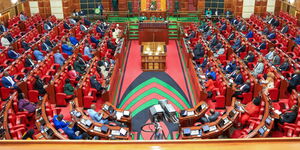Trans Nzoia Governor George Natembeya has rejected the new Electronic Government Procurement (eGP) system, arguing that it will negatively impact Kenyans in the Small and medium-sized enterprises/businesses (SMEs) sector.
Speaking on Wednesday, September 3, Natembeya alleged that the system would plunge low-income Kenyans into more poverty.
He argued that the digital rollout would disproportionately benefit well-connected individuals while locking out grassroots traders and small-scale businesses looking for government tenders.
‘’The e-procurement is going to bring immense poverty, one that has never been seen before. Those people at the bottom, those who are supposed to be empowered, are not well exposed to technology, most of them don’t have smartphones, and the system is complicated’’ Natembeya explained.
While explaining how the system works, Natembeya explained that all businesses will have to be put into the system. However, Natembeya says that it would not be good, especially for the procurement of small businesses.
‘’All government businesses done as a county will now have to be put in the system. There is a possibility that someone in Mombasa would see it, while you have quoted it at let’s say Ksh700, and they counter you and quote Ksh300. This means they will get the tender, while you here in Trans Nzoia miss out,’’ the Governor explained.
Further, the governor pointed out loopholes in the system, alleging that those in charge of the system have been going through training but have yet to grasp how it works, stressing its complexity.
‘’If those in charge have been undergoing training for three weeks and they still do not yet understand it, what do you expect of low-income Kenyans? This would completely lock them out,’’ the governor continued.
The governor’s remarks come amid growing resistance from the Council of Governors (CoG), which has demanded that the National Treasury halt the rollout until proper consultations, legal alignment, and capacity-building are undertaken.
Natembeya echoed these concerns, stating that counties were not adequately prepared for the transition.
According to the governor, this is one of the moves the national government is using to manage county governments.
‘’What they don’t know is that all this money should be in the counties, spread in the county and circulate in counties so that we can eradicate poverty in counties,’’ the governor explained.












